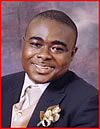Thursday, October 22, 2009
By Dr. Sodzi Sodzi-Tettey


Here in Africa, how does one acknowledge glaring poverty and not yield to despair? How does one recognize amazing opportunities and yet not be enraged about their underutilization? How does one see Africa’s crippling disease burden and yet manage to notice the commitment of some professionals to make a difference?
It is possible if we focus on two things: what works and celebrating success. Anything else and the people best placed to address our common challenges are at once disabled. Unduly focusing on our tribulations would therefore be counterproductive. Those who have will testify how brooding interminably over the paradox of the African development morass have been left so overwhelmed by its sheer magnitude they hardly knew where to start the change process. That negative focus is at once disabling and disempowering. On the other hand, focusing on our strengths coupled with appreciating the majesty of Africa has been known to leave people energized, enabled and empowered by the little things that we can do now to improve our lot.
But of course, there are two obstacles. I see many young people crippled by the magnitude of what they want to achieve. Sadly, some also seem to underestimate the great work they are currently doing. You want to be Obama at once! What we want to do is so big. It intimidates us and we end up doing nothing. I have come to appreciate that what ever one wants to do is perhaps not as important as how well you want to do it. If you do whatever is allowed by your core competence and your passions well enough, you will have impact irrespective of how insignificant your exertions may initially appear.
Kenyan Dr. Wangari Maathai won the Noble Prize for something perhaps as ‘insignificant’ as tree planting. In her own words “It is the little things citizens do that’s what will make the difference; little things like planting trees.” So, what are today’s challenges and how can your leadership make that difference?
A couple of months ago, I was in Ghana’s Upper East Region-a place variously described as poor and deprived. In deed, in some preliminary work done by the UNDP, one District would score interesting marks on the three parameters that measure human development: life expectancy, education and living standard. With a life expectancy less than 60 years, with more children of school-going age outside school than in school, with almost 30% illiteracy rate, (an improvement on the 64% observed in 2000), with a doctor: patient ratio of 1: 31, 000, with “non existent” sanitation, with all rural dwellers having no access to pipe borne water and having to walk over thirty minutes before accessing public transport, the consultant reached the following conclusion.
“The level of deprivation in this District appears lower than the rest of the Upper East Region and to some extent the nation as a whole!” Makes you wonder what’s going on elsewhere.
But that is not all I saw. I also recall the difference that leadership could make. I saw health managers in the region recall with pride that severe human resource constraints notwithstanding, maternal mortality has steadily dropped from 40 in 2006 to 27 in 2008. I saw them fine tune home grown strategies for attracting more professionals into the area. I observed how far from being crippled by their daunting challenges, they seemed energized by the prospect of turning things around.
With the advent of the National Health Insurance Scheme (NHIS), out-patient attendance has increased by more than 100% and total admissions by 18% in the Upper East Region. Meanwhile, the numbers of professionals and facilities have largely stagnated. Soon the NHIS will start accrediting health facilities based on personnel and equipment availability. The criteria demands for example that a facility like the Bolgatanga Hospital currently with 4 Ghanaian doctors ought to have a minimum of 16 doctors.
But once again, leadership demonstrated to me why having the right attitude is far more important than focusing on your tribulations. They said “We cannot compromise on quality. Is it because those well equipped health centers in Accra deserved better than our people here?” In the end, despair gave way to hope.
And so with all due respect, forget about tribulations. People are confronting their challenges. Right attitude is vital which is why we must focus on three key areas: developing a national/continental sense of urgency, building a critical mass of change agents and strategic leadership.
In the bushes of Yua near the Burkina border, health officers maintain the potency of vaccines through solar-powered fridges even if they themselves have no radios. Health workers enthusiastically embrace a new test kit aimed at eliminating the presumptive treatment of malaria. A disease control officer rides his motorbike deep into the interior to collect sputum samples so that “Accra” can find out why the old man is still not responding to 6 months of anti-tuberculous treatment. In Kologo, midwives often have no option than to do home deliveries; terrible lighting, woman on a mat and midwife squatting. Very uncomfortable for everyone but the records will reflect they are making a difference in their communities.
These are the change agents that we speak so eloquently of and money is not always their motivation. Something definitely is working in many places as people focus on what they can do rather than throw up their hands in despair.
Dr. Sodzi Sodzi-Tettey writes for www.AfricanLiberty.org. He is a medical practitioner and health policy analyst.
